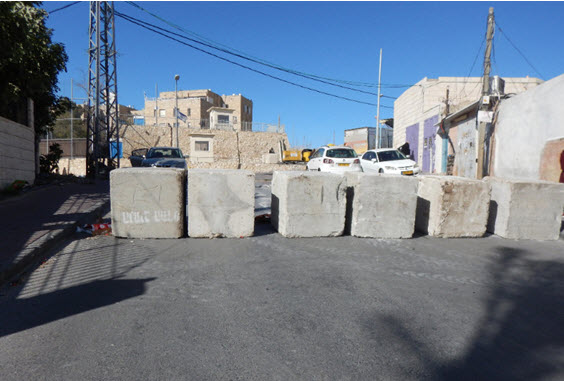On Sunday January 8, 2017, 28-year-old Fadi al-Qunbar – a resident of the East Jerusalem neighborhood of Jabal al-Mukabber – rammed the truck he was driving into a group of Israeli soldiers on tour in the Armon Hanatziv Promenade, also in the occupied eastern part of the city, killing four: Yael Yekutiel, 20; Shir Hajaj, 22; Shira Tzur, 20; and Erez Orbach, 20. Another fifteen soldiers were injured in the attack. According to B’Tselem, since the attack by al-Qunbar, who was shot dead while in the vehicle with which he rammed the soldiers, Israeli authorities have adopted a series of punitive measures against his extended family and other local residents. Such measures clearly constitute unjustified and illegal collective punishment, targeting individuals who have not been charged with any wrongdoing.

Roadblock on al-Madares Street in the East Jerusalem neighborhood of Jabal al-Mukabber, put in place after Fadi al-Qunbar, a resident, rammed his truck into a group of Israeli soldiers, killing 4 and injuring 15, January 8, 2017. (Photo: B’Tselem)
On Tuesday January 10, 2017, dozens of police officers and Jerusalem Municipality inspectors arrived in Jabal al-Mukabber with bulldozers and demolished three stables and a trailer home. In addition, the inspectors taped warning notices to the doors of some forty homes, stating that they were built without permits and that administrative proceedings to demolish them had been initiated. These structures all belong to the extended al-Qunbar family or are located near the home of the perpetrator of the ramming attack. While in the neighborhood, the police and inspectors measured Fadi al-Qunbar’s home, apparently as a preparatory step prior to issuing a punitive demolition order. Many residents would not speak with B’Tselem’s field researcher or the media for fear of reprisal by authorities.
A day earlier, on Monday January 9, 2017, a large detachment of police arrived at the al-Qunabar home and tore down the mourners’ tent they had erected. Police also restricted passage in and out of the neighborhood by closing off its western entrance (from al-Madares Street), and at the last reporting it was still closed. On Monday afternoon, several members of the extended al-Qunbar family were summoned to appear at a hearing on Wednesday at Israel’s Population and Immigration Authority prior to revocation of their status as residents of Israel. Israeli human rights organization HaMoked – The Center for the Defence of the Individual, which represents four members of the family in the proceedings against revocation of their resident status, wrote to the Population and Immigration Authority stating that they would not attend the hearing because of the short notice given, a time frame which raises concerns that the hearing is being held only for the sake of appearances.
Imposing collective punishment along with adopting administrative measures against Palestinian neighborhoods in East Jerusalem is an acknowledged policy of the Jerusalem Municipality. Mayor Nir Barkat even publicly boasted about it several months ago. He did so again more recently, following the public dispute over the outpost settlement of Amona. The measures being adopted now against the residents of Jabal al-Mukabber seem to be a further implementation of this discriminatory policy. While the policy is overt, this does nothing to diminish its unjustifiable and criminal nature which involves widespread persecution by the authorities of thousands of Jerusalem residents.


